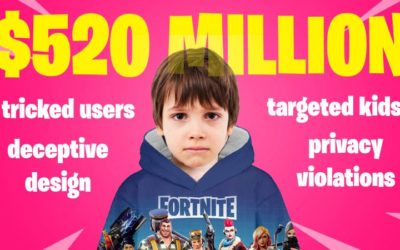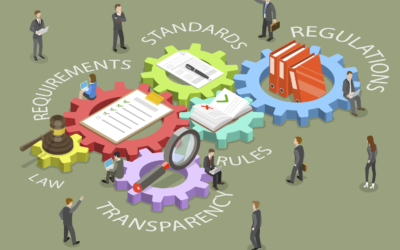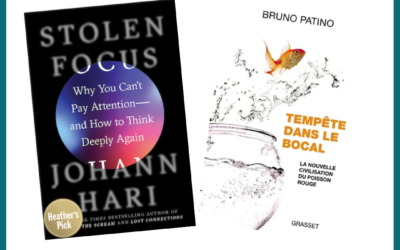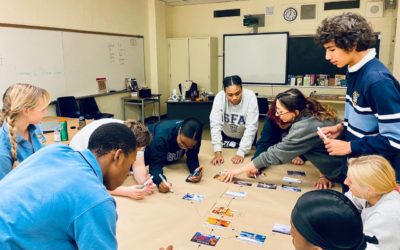Toronto, Canada’s largest city of about 3 million in its core, and 6.4 million in its greater Toronto area, is electing its mayor October 24, 2022. The campaign opposing two-term incumbent John Tory to 30 other candidates has been tepid to date, as The Globe and Mail outlines here. The stakes are high though. With Toronto poised to grow by over 1 million in the next fifteen years, its policies on housing, green space, bicycle lanes, public transit, transportation, local taxes, climate and, yes, technology, are going to have a major impact on Torontonians and Ontario, Canada’s most populated province.
Today, almost one in five (18.1%) Canadians and close to half (44.4%) of all Ontarians live in or around the city of Toronto (in the Greater Toronto Area or “GTA”).
We decided to look at the campaign through our Tech for Good lens in three ways:
- We feature the campaign on Tech for Good Canada’s Twitter feed, Facebook page and one of our TikTok accounts in the hopes that this will help better inform voters
- We are analyzing candidates’ digital media litteracy , ie how they reach out online
- We’re looking at the presence of Tech as an enabler in their platforms ( “civic Tech”)
Coming here is a recap of our findings on use and mention of Technology in Toronto’s 2022 mayoral campaign.
Featuring the Toronto Mayor Campaign on the Web, Twitter, TikTok and Facebook
We sought to understand how well voters could find information about candidates, should they seek it, because very little was coming to them from the City. In fact, many expressed surprise they did not receive their voter cards, despites having voted in the past.
Information about the election is available here on the city’s web site and its Twitter accounts. However, I hope you’ll agree it does not help voters choose among this bland list of 31 candidates.
So we used our Twitter Tech for Good Canada account , its Facebook page and the We Stop Scrolling TikTok account tracking social media activism to feature an equitable selection of tweets from candidates, interest groups, journalists, informed citizens and traditional media about Toronto’s October 2022 election. Hashtags like #TOPoli, #ToVotes, #TorontoVotes and #ToVotes22 are a way to find those conversations online. We also curated a list of To Poli accounts on this Twitter list.
Here one of our retweets : a citizen reviews participation rates in the previous Toronto mayor election.

Featuring the Toronto Star’s Vote Compas as a Tool for Voters

I did stumble upon the Toronto Star’s online Vote Compass tool. It asks 30 quick questions and then offers a list of candidates closest to the voter’s responses, with a percentage. In 5 to 10 minutes, a voter who has not heard anything about the candidates can be closer to making an informed decision about their future. To me, that’s exciting Civic Tech.
Assessing Top Candidates’ Digital Media Litteracy and Facebook Ads Spend
We’re looking at how proficient the top 6 candidates are using the web and social media, a necessary skill for any leader today.
Details are coming, but we already know that most of them except for John Tory have little to no campaign presence on Facebook but all of them do have some presence on Twitter. Stephen Punwasi is the one really active, on TikTok, here, as well, with strong policy explanatory videos.
Twitter presence of top mayoral candidates:
Below are screen shots from the top 6 Toronto mayoral candidate Twitter accounts






Gil Penalosa, a senior urban planner with international experience, Stephen Punwasi, a geeky entrepreneur behind an incisive real estate market newsletter, Sarah Climenhaga, an environmentalist and proud mother, among others, are active tweeters, with more or less of an audience. So is of course incumbent mayor, tweeting as a candidate, John Tory and, to a lesser degree, Chloe Brown and Jack Yan.
Facebook Ad Spending by top 6 candidates:
Here’s data from Facebook’s ad library on advertising spending on its platform from those candidates that did engage in advertising there since July 2022.
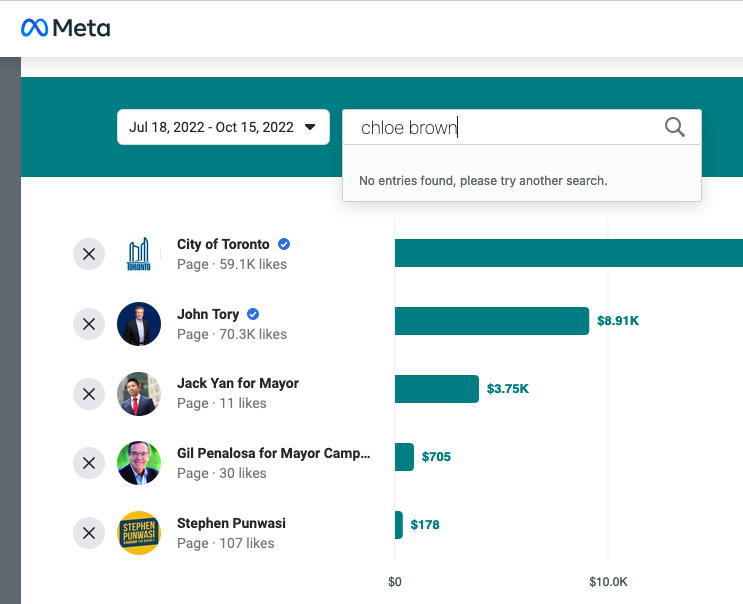
John Tory, the incumbent, is clearly the largest Facebook ad buyer, with almost $9 000, and Jack Yan spent $3 750 on Facebook ads, despite a very small Facebook following, here, while Gil Penalosa, Sarah Climenhaga, Stephen Punwasi and Chloe Brown spent almost nothing on Facebook ads.
Looking at Candidates’ Digital Litteracy : Presence of Tech in Platforms
We’re also looking at how the top six candidates are mentioning leveraging technology for the public good in their platforms, ie, “civic tech“.
Our main questions are:
- Open data vision
- Digitization of city services
- Inclusivity and accessibility in digital access to city services
- Educating the public on digital city services/online media litteracy
- Transparency of city’s Tech spending, by program type
- Transparency on Tech procurement
- Set up of city digital project management: tech skills versus UX, Privacy by design and public policy experts
Full details are coming as well. We’ll discuss them in the upcoming episode of our French language podcast “Derrière nos Ecrans” ( “Behind Screens”) .
Chloe Brown, a policy analyst with the Future Skills Institute, has a very strong lead on the other five.
She brings up leveraging data to help make informed public transit decisions, as well as applications to make building permits and finding a rental unit more efficient.
Sarah Climenhaga is the only candidate who has responded to our list of questions so far, with her caracteristic collaborative, open-minded and simple approach.
No grand plans here, but the will to be transparent in city Tech spending, in its sharing of city data and in including residents ( not just citizens, she notes) in designing technology-enabled solutions to Toronto planning.
Stephen Punwasi, who has a computer science background, promotes civic Tech on his platform, and has recently added details to it on his site here:
- An open source city for Toronto: ”
Imagine a city where smart software helps reduce your commute time. What if I told you we got it from Halifax, and it won’t cost us anything? They gave it to us, reducing the time it would take to implement our own system, learning from their issues.
At the same time, they’re using software we built to monitor their air quality. We both benefit from our respective experience, reducing expensive lessons. It sounds wacky, but that’s how open source software works and it’s how the internet was built. “
Tech-enabled transparency in city spending:
” Produce essential software to increase transparency. The best disinfectant is sunlight, and we’re going to eliminate the opacity that plagues our system. We’ll leverage our Open Source City plan to produce cost-effective solutions that make it hard to hide. “
High-speed internet is essential for life in Canada, and it’s required for business. It’s how we communicate with our friends and family, and it’s where we watch cat videos. That’s why we have a revenue neutral plan that’s going to drive down the cost, and make it more accessible for all. There’s also no reason it can’t be the best internet service you’ve ever had.
Our plan is to establish a municipal high-speed internet company in charge of the pipes. We’ll leverage our existing fiber optic network powering City services. It will also benefit from our unified infrastructure plan. No, this isn’t to stick it to the Big Three, but to facilitate more competition. “
Gil Penalosa’s policy platform is focused on traditional urban planning issues ( roads, public transit and housing) , so his campaign says little about using Technology to reach those goals.
Jack Yan’s platform is focused on security and affordability in Toronto. His platform is quiet on use of civic technology as well.

